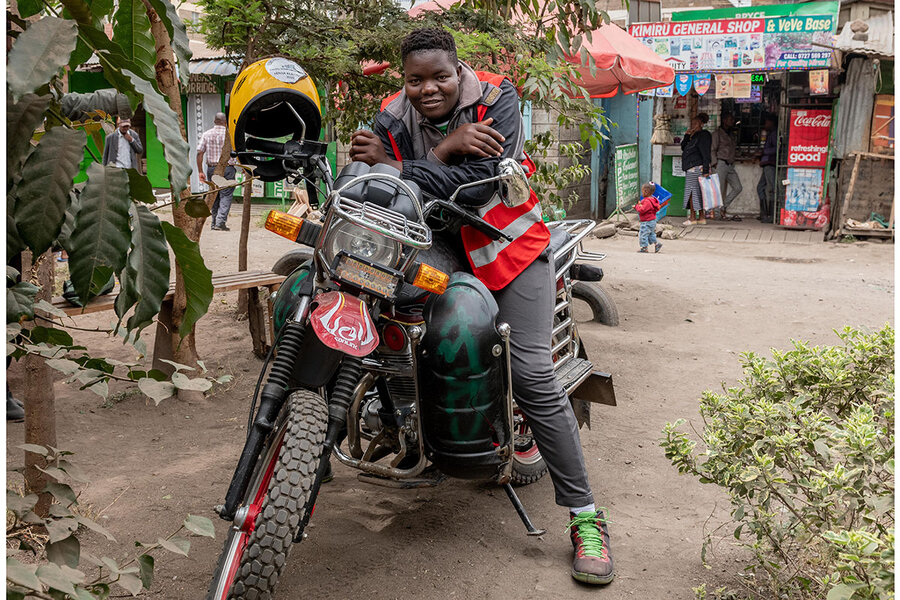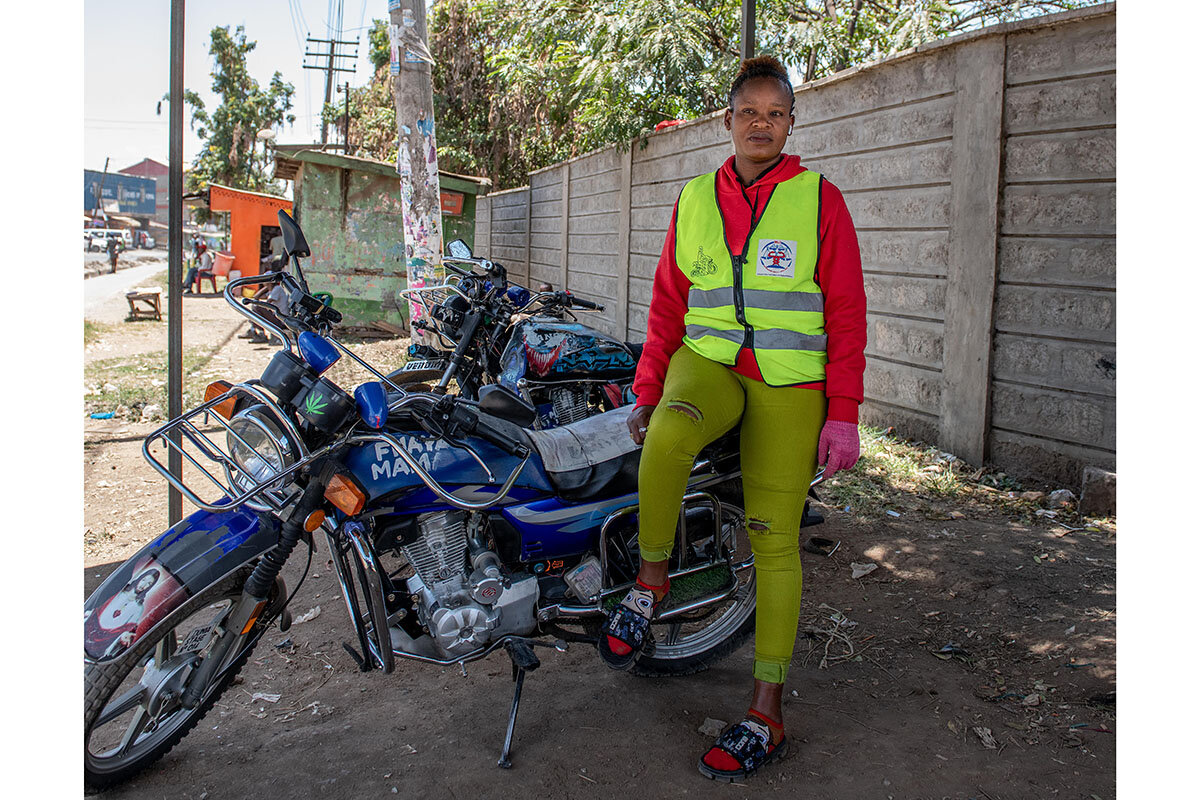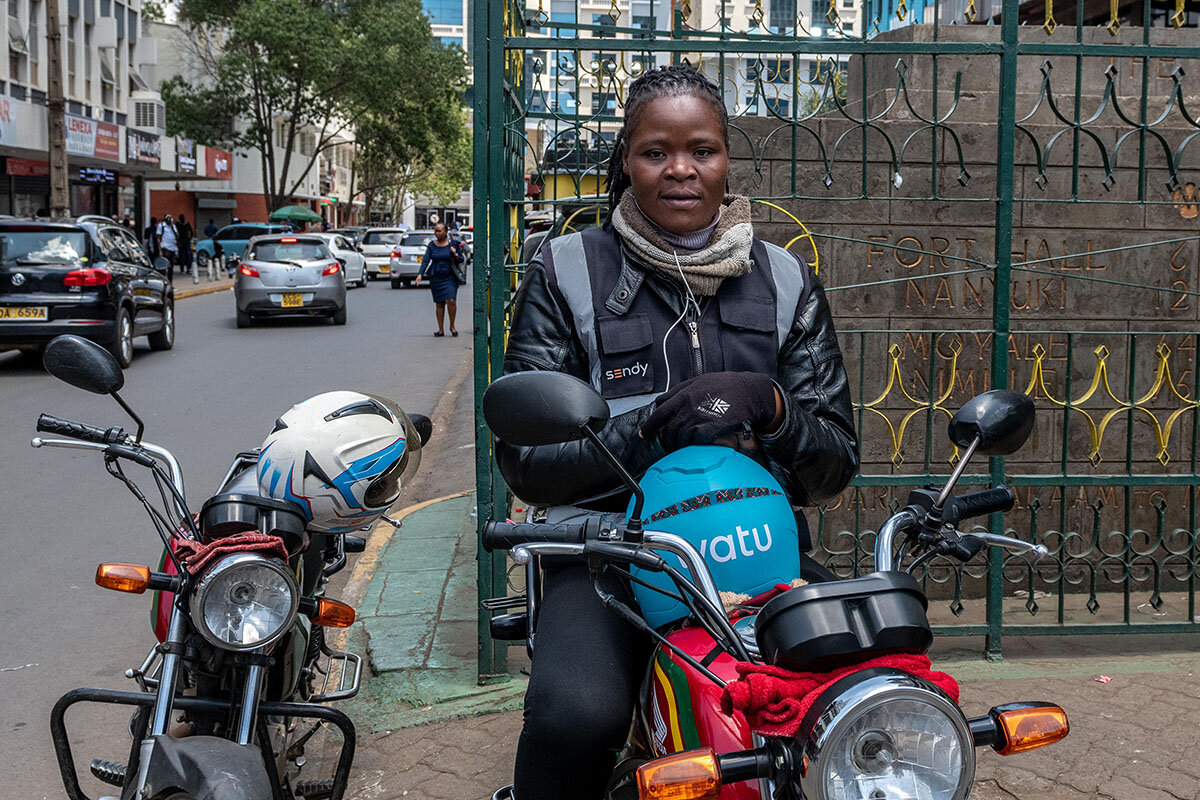‘Fire Mama!’ How women are rising through Kenya’s motorbike taxi ranks.
Loading...
| NAIROBI, KENYA
When Ellen Najala rides her motorcycle through the streets of Dandora, one of Nairobi’s crowded informal settlements, people stop and stare. As she cruises past on her blue bike, with a Jesus decal on the fender, a pot leaf sticker on the gauges, and “Fire Mama” scrawled on the gas tank, kids and adults alike wave and call out.
“Fire Mama, Fire Mama!”
Ms. Najala is one of an increasing number of young women who have joined the ranks of Kenya’s bodaboda sector – an army of motorcycle taxi drivers that props up the often chaotic public transit serving Nairobi’s roughly 4 million residents.
Why We Wrote This
A story focused onThe twin crises of the pandemic and soaring cost of living have had some unforeseen consequences. In Kenya, a silver lining is that more women have been inspired to seek careers outside of their traditional gender roles.
The work of bodaboda drivers, whether along the potholed pavements of Nairobi or the rutted dirt roads of upcountry villages, has been almost exclusively the preserve of men. But as the cost of living rises in Kenya, and gender roles loosen among younger generations, more and more women are donning helmets and becoming motorcycle taxi drivers. But even as the work provides better flexibility and pay than many traditional jobs, women must fight to overcome harassment and danger working in a role widely considered to be a man’s job.
Under the shaded awning of the taxi stand where Ms. Najala works, the men have come to appreciate her skills. “They like to joke, but they show respect,” she says of her fellow drivers.
One colleague, who goes by the nickname Joker, was quick to praise his workmate. “She’s a good driver,” he says. “She gets many customers.”
Driven by necessity
Back in 2015, when Faith Asibwa started working as a motorcycle taxi driver in her neighborhood of Kibera, a woman in the field was so rare that she was touted as the first one in Nairobi. Now, the 32-year-old is the chairwoman of the Nairobi women’s chapter of the Boda Safety Association of Kenya, representing 42 female members.
“There are lots of young women trying to get into the bodaboda business,” she says. With her experience, she’s able to help them navigate the industry. “I help them find training and getting the proper gear so they can work safely.”
Despite recent strides, a lack of female representation and parity remains persistent across Kenya. Historic elections in August brought more women than ever to power – one-fifth of parliamentary representatives are now female – but that still falls short of Kenya’s own constitutional aims for gender representation.
Meanwhile, out of an estimated 1.5 million bodaboda riders – the unregulated nature of the industry makes it difficult to determine an exact number – there are just 5,000 women drivers, the Boda Safety Association of Kenya says.
Still, the recent rise of women into the field has been noticed by the United Nations Population Fund (UNFPA), which helped launch the women’s chapter of the Boda Safety Association of Kenya. The organization provided education on gender-based violence and sexual and reproductive health, seeing the drivers as both beneficiaries of training and on-the-street ambassadors.
“They are more affected by most of these issues because of the patriarchal nature of the society,” says Kigan Korir, a UNFPA Programs Specialist.
“I think the motivation for a better return has emboldened most of them to join the otherwise male-dominated sector,” adds Mr. Korir, noting that most of the women drivers have challenging dual roles as single mother and sole breadwinner.
Safer alternatives
Motorcycle taxis are ubiquitous across Kenya – and most of Africa – but the sector is heavily stigmatized. The vast majority of riders are young men, collectively known as vijana in Swahili, and considered by many to be a downside of city living. From accusations of unsafe driving, outright thievery and harassment, or even fueling political unrest, the group is a catchall for whatever ills plague Kenyan cities, intensely disliked by car drivers and pedestrians alike.
In March, a woman involved in a traffic collision with a motorcyclist was attacked by a large group of motorcycle drivers who surrounded her car. The incident went viral, further undermining the sector's reputation.
But such incidents are rare. And motorcycle taxis are a key part of the transportation chain across Kenya, providing a “last mile” solution for inadequate public transit systems and an affordable, if considerably more dangerous, alternative to taxis.
For passengers, women bodaboda drivers are perceived as a safer alternative to male drivers. It’s less the fear of robbery or assault, they say, than the women riders’ extra care and responsiveness to concerns.
“I’m not a rough driver,” says Ms. Najala, from Dandora. “We’re more careful, and women passengers trust me to drive well and not be drunk.”
Often, she says, that means slowing down when asked and not recklessly overtaking cars in the oncoming lane or splitting traffic at high speeds.
Safety is a concern for both drivers and passengers. For women drivers, there is physical danger present in their work. Very few are willing to work after dark. Everyone knows a story about a driver who was guided by a passenger into an ambush, where they were beaten and robbed of their motorcycle by waiting accomplices.
The women cope with that reality by devising their own personal safety rules, ranging from never carrying two passengers to avoiding dangerous neighborhoods or texting their location to others while riding.
Despite the dangers, there’s been a steady increase in women drivers. Many, like Vivian Atieono, enjoy the flexibility provided by the work as they juggle work and child care.
Ms. Atieono can now take her daughter to school, work for a few hours, take a break to play basketball, look for more fares, and still be home in time to get her daughter from school, she says. For the 21-year-old, the benefits go beyond setting her own schedule. The work also pays better than traditional jobs like cleaning houses. After paying the bike’s owner a daily rental fee of 500 shillings (about $4), she takes home at least as much herself at the end of each day.
With riding motorcycles all day – being exposed to the hot sun or the pouring rain, bouncing over speed bumps and down rutted dirt roads – the work takes a toll on drivers. Most of the women in the industry are young, and while the money is good now, they’re already looking to the future.
Sitting astride her bike at the downtown intersection where she works, Ms. Asibwa gives the same answer as just about every other motorcycle driver when asked what’s next: driving a taxi.
“I’m hoping to move to another level, maybe driving an Uber – but it’s difficult to afford a car,” she says. “When you are getting paid in cash each day, not a monthly salary, it’s hard to save money.”
Before she could elaborate on her plans, a woman in a brightly printed dress approached, phone pressed to her ear, and fluttered her hand to indicate she wanted a ride. She climbed aboard the motorcycle; Ms. Asibwa kick-started the bike, donned her helmet, and was gone in a moment, disappearing into the ceaseless flow of Nairobi traffic.







